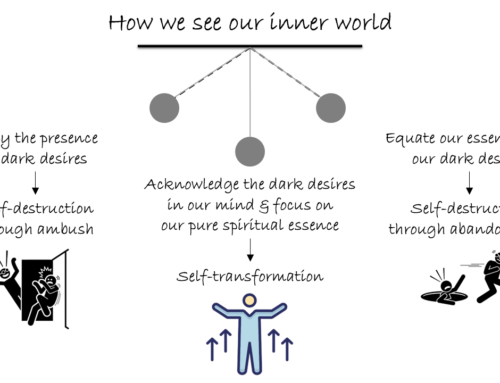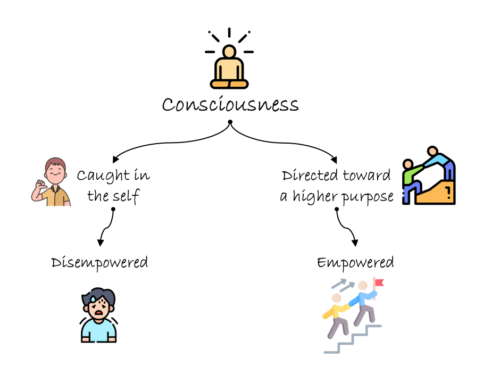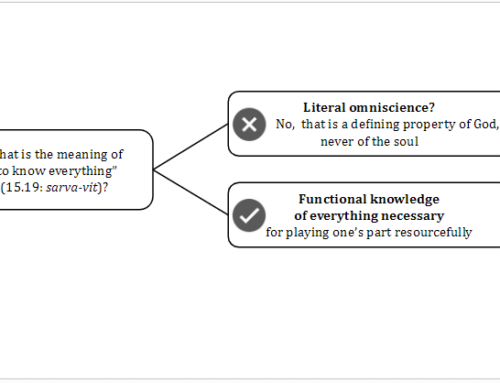Let our thinking not be wishful or fearful; let it be prayerful and purposeful. Our thinking capacity is our most powerful capacity. It is the utilization of this capacity that lifts humans above the animal world, and such utilization can enable us to find a sublime meaning and divine purpose in our lives, thereby fulfilling our deepest potential and experiencing existence’s highest blessings.
Unfortunately, despite having this glorious capacity for thinking, we often fail to utilize it adequately. Far from it, we frequently fritter away this astonishing capacity on things that are trivial or inconsequential. The two main ways in which we misdirect and squander our thinking capacity are through wishful thinking and fearful thinking. The Bhagavad Gita 18.35 outlines several such self-defeating modes of thinking.
When we are enticed by wishful thinking, we waste our thoughts on daydreaming. We fantasize about a better future without dwelling on or finding any actionable pathway toward actualizing that dream or considering taking any tangible steps to move closer toward transforming that fantasy into reality. Such wishful thinking dissipates our thought energy in the direction of the future.
Fretful thinking, on the other hand, misdirects our energy toward the past. We let our thoughts go on an endless loop, replaying everything that went wrong, be it the bad things that happened to us or the bad things that we did. Such fretful thinking about how bad our past has been often gets projected onto the future, leading to fearful thinking. In this state, we unwittingly produce horror movies in our minds about all the terrible things that may happen to us or the terrible things we might do.
How can we avoid the traps of wishful and fearful thinking? By cultivating thinking that is prayerful and purposeful.
Prayerful thinking raises our thoughts toward the Divine, providing a pathway out of the mental turbulence caused by our thoughts being tossed between the future and the past. Prayerful thinking reminds us that, despite the chaos that may seem prominent in our lives, there is indeed a divine overseer. By his omniscience and benevolence, he is capable of drawing us toward auspiciousness and flourishing, despite whatever may have happened in the past or whatever may befall us in the future.
For our thinking to be productive, it needs to be not just prayerful but also purposeful. Prayer doesn’t just remind us that God is in control, guiding our lives, but also that he has a part for us to play. We are all his eternal parts, as emphasized in the Bhagavad Gita 15.7. When we strive to act with a service attitude, contemplating what we can do in our present situation to make things better or at least make ourselves better, we start having a purpose that moves us out of our head and into tangible actions in the real world.
Even if this purpose doesn’t emerge clear and fully formed, as if through some magical revelation, we can progress toward it by cultivating simple curiosity about what resources we have to deal with the situations we face and by taking small steps. The Bhagavad Gita 10.10 assures us that our devotional service attitude will aid our connection with the Divine, through which we start getting increasingly clear guidance on how to move ahead.
When we make our thinking prayerful and purposeful, we can tap into our power of thinking most efficaciously, thereby creating the brightest future for ourselves and those around us, both in this world and beyond.
Summary:
- Our thinking power gets dissipated by wishful thinking about the future and fretful thinking about the past, which leads to fearful thinking about the future.
- Prayerful thinking raises our thoughts above the turbulent tossing between the past and future to focus on the Divine, who is guiding us and the world toward auspiciousness and flourishing.
- Prayerful thinking leads to purposeful thinking, wherein we understand that we are parts of the Divine and strive to play our part in making things better or at least improving ourselves.
Think it over:
- Identify two typical ways in which your thinking power gets dissipated in wishful thinking.
- Consider two ways in which fretful thinking about the past propels you into fearful thinking about the future.
- Reflect on one situation where you can shift your thinking to become more prayerful and purposeful.
***
15.07 The living entities in this conditioned world are My eternal fragmental parts. Due to conditioned life, they are struggling very hard with the six senses, which include the mind.





Leave A Comment